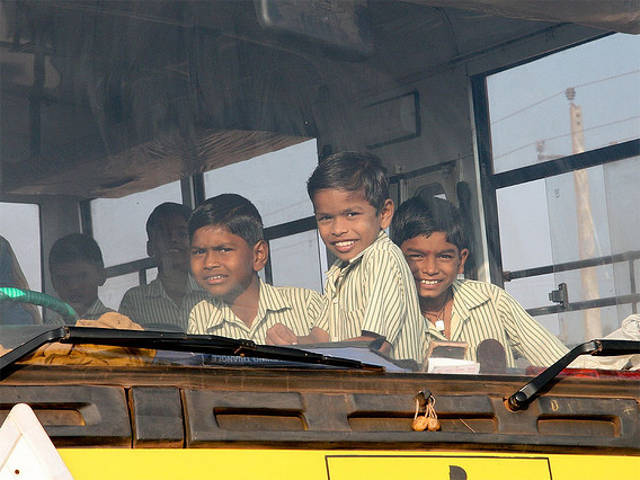Sustainable transport can save lives on India’s roads. The key focus of the CONNECTKaro 2013 session on “Road safety in Indian cities” was to highlight the magnitude of the challenge of road safety in India through case studies of different practices in Indian cities. Each panelist presented a different road safety-related case study, taking a variety of different perspectives. The main objective of the session was to take steps towards achieving a better understanding of what the scale of the road safety problem in India is. This blog post presents key takeaways from the session.
A variety of participants attended CONNECTKaro 2013, including transportation experts and government representatives. Chairing the session was Mr. Vivek Phansalkar, Joint Commissioner of Police and Traffic for Mumbai.
Better data collection saves lives
Efforts toward better data collection for road accidents can have a tremendous impact on improving road safety in India. Ravishankar Rajaram, Safety Group Manager at JP Research India, presented his firm’s efforts to improve data collection, highlighting the importance of accident data investigations — even CCTV camera footage — to gain better insight into common road accidents.
Hospitals, too, play a unique role in helping to understand road accidents better. Dr. Girish Rao, from the National Institute for Mental Health and Neurosciences in Bangalore, made this case, explaining that better hospital data would aid in determining the socio-economic impact of road accident deaths in India. Raising the important issue of drunk driving and driving without helmets or seatbelts, Dr. Rao outlined how a business-as-usual attitude to road safety was costing lives in Tumkur, and he asserted the need for further research in this area. These two panelists underscored the need for improving data collection and maintenance practices, which inspired a recent joint study carried out by EMBARQ India, in association with the Mumbai Traffic Police.
Efforts to understand what’s happening on the ground
Ranjit Gadgil, Project Director at Parisar (a civil society organization focusing on sustainable development in Pune, India), gave an overview of the key findings of a study which Parisar conducted, in association with EMBARQ India, on opinions and behavior of drivers of two-wheelers in Pune City. A large number of respondents reported at least two accidents in their lifetime and yet a preference for optional helmet use. Interestingly, most two-wheeler accidents in Pune did not involve other types of vehicles (i.e. they were either instances in which the driver fell off or collided with another two-wheeler). He also addressed how strengthening traffic enforcement and improving road design for two-wheelers would make roads safer in Pune.
In the state of Punjab, only a single district in has reduced road accident fatalities over the past decade, whereas nearly all others witnessed more fatalities over the same time period. Gurmehar Singh, from the Regional Institute for Management and Technology in Punjab, highlighted this trend and other key road safety statistics from the state. Recent findings from road safety audits in and around Ludhiana illustrated faulty infrastructure in rural and urban highways.
Using data to set guidelines and match global standards
In light of the ballooning number of proposed (and operational) Bus Rapid Transit (BRT) projects in various Indian cities, it would be crucial to apply global BRT safety guidelines to the Indian context. Binoy Mascarenhas, an associate in urban transport at EMBARQ India, touched upon the upcoming safety guidelines developed for Bus Rapid Transit (BRT) systems in India by EMBARQ India. The document is slated to release by the end of the year, and is currently undergoing peer review.
As referenced before, EMBARQ India’s road safety assessment of Mumbai highlighted how the rate of traffic fatalities per year was on the decline from 2007 to 2012, while serious injuries remained worrisome. A 7-point agenda for road safety was presented, with improved accident investigation systems, driver training and e-enforcement as some of the key thrust areas to be taken up by the Mumbai Traffic Police. Vivek Phansalkar outlined key areas in which his establishment was working in order to bring about safer roads in Mumbai. Throughout, he stressed that the Mumbai Traffic Police was very open to citizens’ suggestions and was constantly making efforts to enhance existing road safety enforcement measures.
In conclusion, efficient data collection and management can help greatly in achieving the goal of better understanding the magnitude of road safety problems in India. While strengthening enforcement is important in reducing the number of alcohol-related deaths, as well as deaths resulting from poor use of seatbelts and helmets, the panelists agreed that there is a need to focus more on making our streets safer for the most vulnerable road users – pedestrians and cyclists. Modes that carry the most people – public transport, in particular – should be given consideration. Buses should be segregated, and roads should be specifically designed to cater to public modes. Moving towards better policies that address these key challenges will bring about safer roads in Indian cities.
For more information on CONNECTKaro 2013, check out Anirudh Tagat’s full conference presentation and others on Slideshare.





















